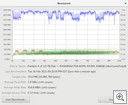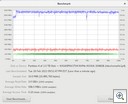This post is a bit off the original plan, mainly due to timing. Short version on the timing, my Dell 7750 notebook (The one with a Xeon processor, 128G ram, and NVME storage…) had to get replaced. Dell was good about the swap ( due to a really weird issue), and I ended up with a spare powerhouse of a notebook for a few days. So, I decided to run some test with UEK Storage I/O vs RHCK I/O.
That being said, both tests were done with the same notebook, the same OS install and the same test. The only difference is the kernel.
The first test was run with the RHCK kernel, this is the same Kernel found in RedHat Linux 8, CentOS 8 and of course Oracle Linux 8. It’s a older 4.18 based kernel.
The summary of the run is 2.9 GB/s read average, 414.8 MB/s write average and .13 msec latency. What is really interesting is looking at the latency ( green) samples, they are all over the place, with latency as high as almost .3 msec! Read and write performance is also all over, with large swings through the test.
Next… a reboot while I swap over to a newer UEK kernel.
The second test was done with the UEK kernel, based on the Linux 5.4 kernel. Linux 5 kernels have been available since March of 2019, with Oracle shipping their build in March of 2020. Being it’s 2021, I am a little surprised that Redhat doesn’t have a Linux5 kernel available yet!
The summary of the UEK run is 3.0 GB/s read average, 595.5 MB/s write average and .10 msec latency. What is interesting is looking at the sample, especially latency. It is almost as flat as a pancake when compared to the other kernel. Read and write stability is also noticeably better, with significantly less variance through the run.
While this is not a million-dollar performance test, I feel it is a good comparison of the kernel differences, and you can really see the enhancements for Storage in the UEK kernel. Not only was it noticeably faster in wrote performance, but the latency was also much more predictable. Hopefully, this has answered a few questions about the difference in performance.

